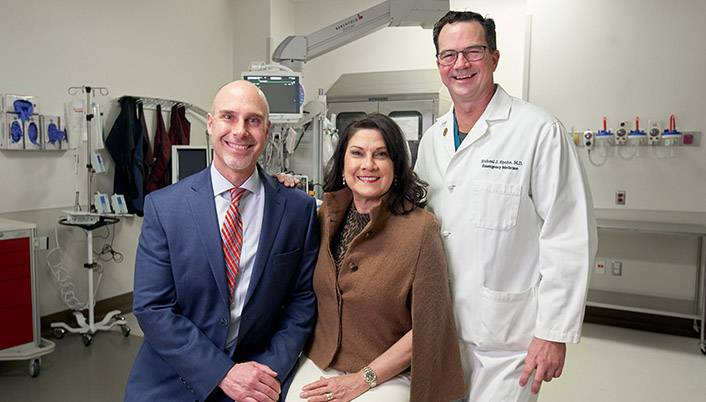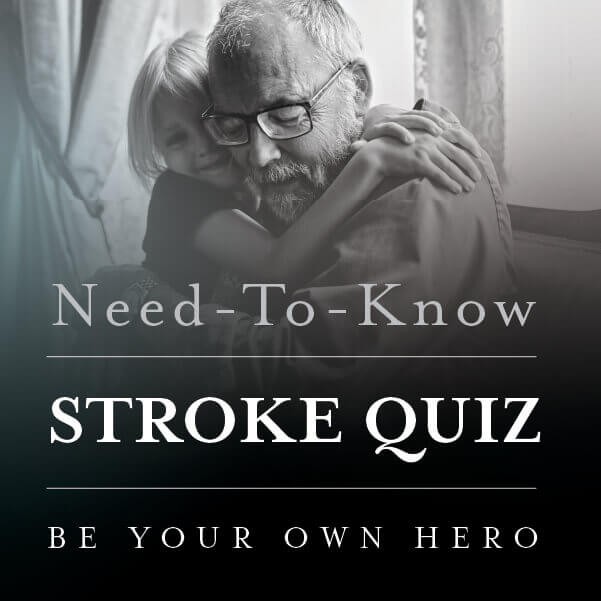JoAn Majors

“Nobody was talking, but everyone was looking at each other. They were very intentional with what they were doing. It was like a beautiful orchestra, where everyone was playing their instrument in harmony. It was so comforting.”
Motivational Speaker Experiences Life-Changing Miracle Following Stroke
As an expert in soft skills and a motivational speaker, JoAn Majors often describes herself as a challenging patient. But at a time when quality of care mattered most, she had a perfect experience at the hands of her care team at St. Joseph Health Regional Hospital.
On the day Majors suffered a mini-stroke, she woke up to strange sensations in her body, including a thick and heavy tongue. Deciding to work from home, she tried to go about her morning routine for a while until her administrative assistant, Sherry, suggested that she lay down on the couch.
“When Sherry returned to the room, she said, ‘let’s take your blood pressure.’ She was looking at my face,” said Majors, 58. “When we saw my blood pressure – 199/127 – my eyes welled up with tears. I knew I had to go to the hospital.”
A Family History with Stroke
Majors, whose mother had a stroke at the age of 30, was all too familiar with the signs of stroke. And, as it turned out, she developed her blood clot in the very same artery that caused her mother’s stroke – in her basilar artery.
The basilar artery, which is formed where the two vertebral arteries join at the base of the skull, carries oxygenated blood to the cerebellum, brainstem and occipital lobes.
Majors also experienced drooping and paralysis on the right side of her face and body, just as her mother had following her stroke. Despite her mother’s history with stroke, Majors’ providers determined she possessed no other risk factors for stroke.
“I’m not overweight, I’m not a smoker, and my blood work is pristine,” she said. “I do think it had a lot to do with stress. So many of us live a stressful lifestyle.”
A Beautiful Orchestra
By the time Majors arrived to the Emergency Department, her husband Chuck and personal friend and Chief Medical Officer Dr. Kia Parsi were there waiting for her. The team called overhead that a Level 1 potential stroke patient had arrived, and the team took Majors back immediately.
As Majors watched her care team spring into action, she said she felt immediately comforted. “Nobody was talking, but everyone was looking at each other,” she said. “They were all very intentional with what they were doing. It was like a beautiful orchestra, where everyone was playing their instrument in harmony.”
Majors, who frequently coaches medical professionals on communication and soft skills, said her experience as a patient was incredible. “There wasn’t a lot of chit chat going on,” she said. “Everyone knew their role.”
As Majors received care, Sherry and Chuck, who were both overcome with emotions, were stunned by Majors’ calm composure and good humor throughout her ordeal. “As they cut my shirt off, I asked the nurse to please not cut my bra off,” she said. “I told her it was from Victoria’s Secret, and it was expensive. She just giggled.”
Majors said she did not sense panic from her care team – and this was a reassurance to her.
Prayer for a Miracle
As the Emergency Physician Dr. Michael Spohn explained the potential side effects of the clot-busting medication tPA, Majors’ blood pressure shot back up to 199/118. She had less than an hour window to decide whether she wanted the team to administer the medication.
After the team gave her an injection to try and reduce her blood pressure, Dr. Spohn asked Majors and her companions if he could pray for them. “Obviously, we were thrilled, taken aback and agreeable,” she said. “A feeling of peace came as he prayed to the ‘Mighty Physician.’”
While Majors declined tPA, she still experienced what her providers agreed was a miraculous recovery. “In a matter of 45 minutes, I went from having problems talking and not being able to move my right side to being able to move every part of my body,” she said.
Miracle Workers
When Majors looks back on her experience, she feels relieved and blessed. “It’s the whole experience I had that helped me recover,” she said. “I was never frightened. The team had the whole thing under control. Dr. Spohn was brave enough to pray for me, and I was brave enough to believe it.”
Majors said she developed trust for the team from the minute she entered the hospital, because of the way she was treated. “It’s like patients who see my husband,” she said. “They don’t know if he’s a good dentist, but they do know 100% if they had a good experience.”
Today Majors refers to her care team as her miracle workers and speaks often about her experience at St. Joseph Health.
Slowing Down
Three days after Majors returned home from the hospital, the one problem that remained with her was a stutter – a big challenge for a professional speaker. On occasion, she also struggled to form some words. One of her daughters, a speech pathologist, traveled to Caldwell to stay with her and help her.
“I laid low for several weeks, and then I had a conference call,” she said. “It was great. I just buzzed right through that call.”
While Majors felt better and had recovered from her stroke, she knew she needed to slow down to reduce her stress level. “Before my stroke, I did things out of obligation,” she said. “Now I run everything through the filter of, ‘would this be worth me having a stroke?’”
In some of Majors’ speeches, she tells a story she calls “The Gift.” The story, which is about the passing of her father, focuses on how there is a gift in every day, but sometimes you have to look for that gift.
In the hospital Dr. Parsi told Majors the real gift of her experience is that it happened to her, because it will forever change what she does going forward.
“When he said that, he said, ‘the gift isn’t that you recovered,’” she said. “’The gift is that you had that experience, because you will never be the same.’”

